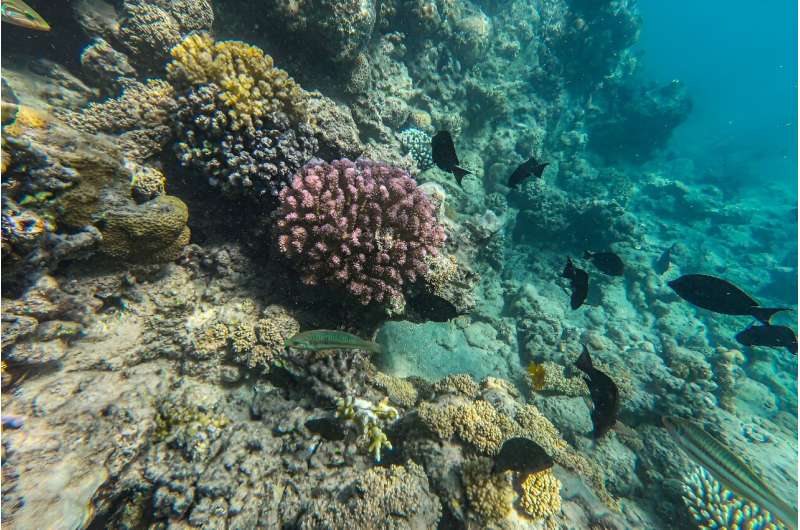This article has been reviewed according to Science X's editorial process and policies. Editors have highlighted the following attributes while ensuring the content's credibility:
fact-checked
peer-reviewed publication
reputable news agency
proofread
Marine heat waves last longer in deeper water: Study

Marine heat waves may last longer and be more intense in deeper water, potentially threatening sensitive species as climate change makes the extreme events more frequent, researchers said on Monday.
Oceans have absorbed 90 percent of the excess heat produced by the carbon pollution from human activity since the dawn of the industrial age.
Marine heat waves—episodes of abnormally high water temperatures—have become more frequent and intense.
These can have a particularly severe impact on species that cannot migrate to escape intolerably warm waters, like corals in the Great Barrier Reef and kelp forests off southern Australia and the northeastern Pacific.
In a new study published in the journal Nature Climate Change, researchers looked at impacts of temperature spikes in deeper waters, which lead author Eliza Fragkopoulou said was "the first attempt to look into marine heat waves below the surface".
"Marine heat waves and their effects have been studied mostly at the ocean surface and we did not know much about their characteristics in the deep ocean," she told AFP.
Using on-site observations and modeling, researchers examined global marine heat waves from 1993 to 2019, including data up to 2,000 meters (6,562 feet) below the surface.
They found the intensity was highest at 50 to 200 meters below the surface, occasionally up to 19 percent stronger than the surface heat wave.
The duration also increased with depth, with warming persisting up to two years after temperatures returned to normal on the surface, the study said.
The scientists looked at a proxy measure of thermal stress known as cumulative intensity and mapped that against distribution of biodiversity at the edge of their maximum heat limits to see areas where marine creatures are potentially more vulnerable to changes.
These high stress conditions overlapped in up to 22 percent of the global oceans, they found.
Regional variability of marine heat waves makes measuring biodiversity exposure complex, and their duration varied by location due to different oceanic conditions.
In general, Fragkopoulou, of the Centre of Marine Sciences at Portugal's University of Algarve, said the impact on biodiversity was likely greatest from the surface to a depth of 250 meters.
The largest portions of the oceans categorized as highly exposed were found in the North Atlantic and Indian oceans, at depths between 1,000 and 2,000 meters.
Better monitoring 'urgent'
A separate study published last month in the journal Nature suggested that some marine creatures can withstand the heat better than others, with a finding that ocean fish can endure marine heat waves with no major impact on their numbers.
Fragkopoulou told AFP that more research was needed on heat waves in the deeper oceans to unpick the potential impacts on tourism and fisheries.
"Considering that marine heat wave impacts on deep-sea biodiversity are still largely unknown, there is an urgent need for more and better monitoring of the global ocean to understand their effects," she told AFP.
More information: Eliza Fragkopoulou et al, Marine biodiversity exposed to prolonged and intense subsurface heatwaves, Nature Climate Change (2023). DOI: 10.1038/s41558-023-01790-6
Journal information: Nature Climate Change , Nature
© 2023 AFP



















